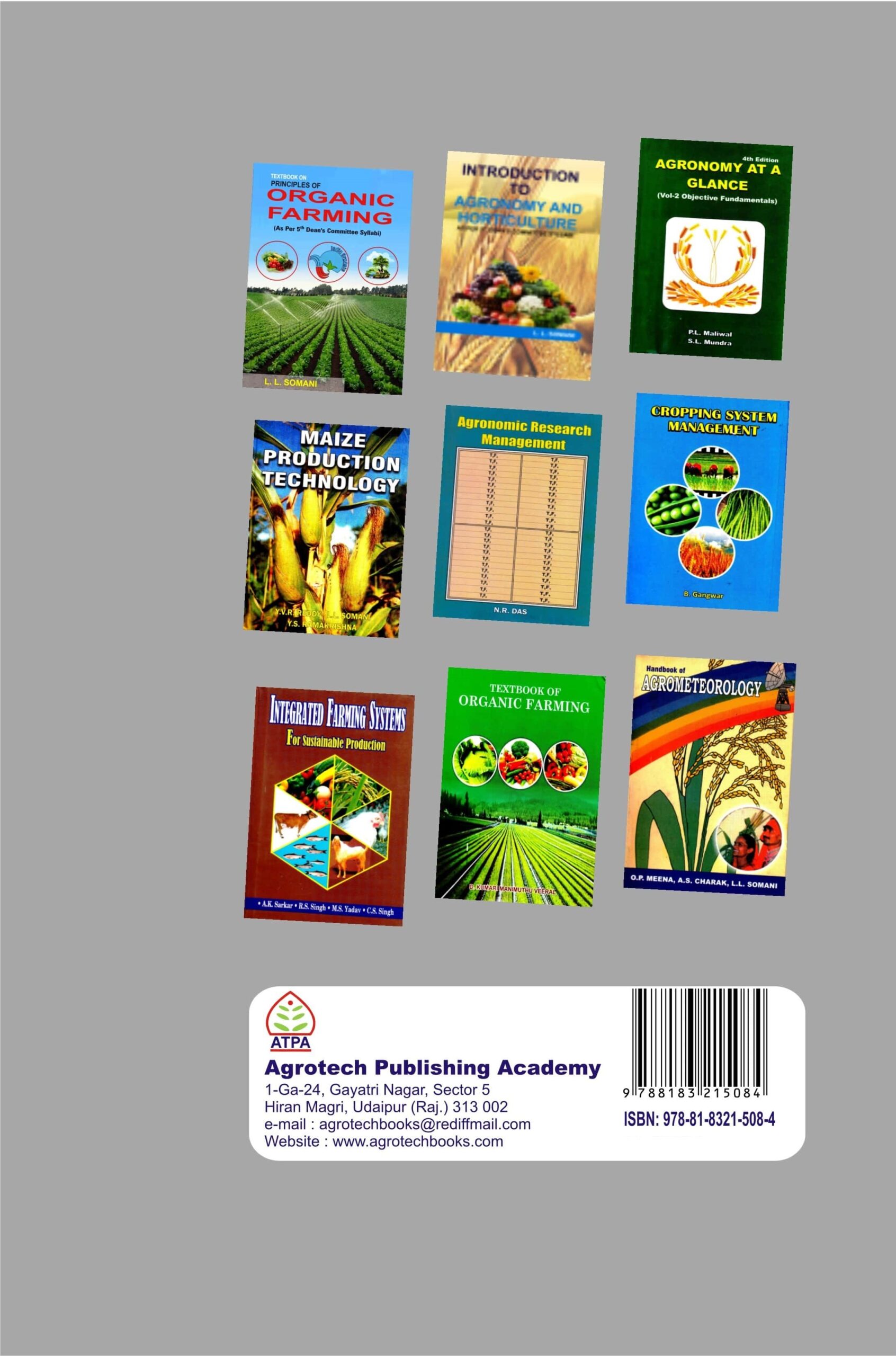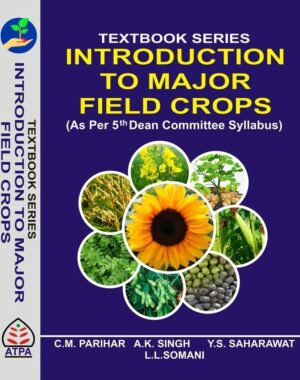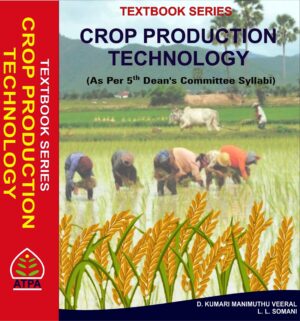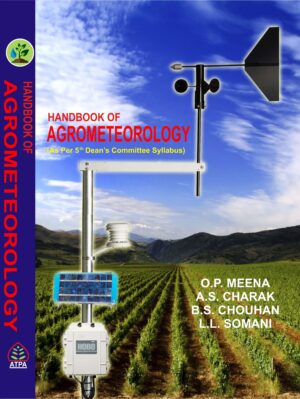FARMING SYSTEM AND SUSTAINABLE AGRICULTURE
₹825.00
AUTHORS: A. ZAMAN AND MD. HEDAYETULLAH
PUBLISHING YEAR: 2020
ISBN: 9788183215084
© All Rights Reserved
Description
ABOUT THE BOOK
The textbook as per ICAR approved syllabi for undergraduate students in agricultural sciences throughout country on “Farming System and Sustainable Agriculture” is organized into 15 chapters. A brief description of each of the chapters follows:
Chapter 1 identifies the farming system, its scope and importance, to realize existing challenges in the agri-management security in the new millennium. Chapter 2 establishes the concept, definition, classification, types of farming system and factors affecting types of farming need for an agricultural policy and presents a sample structure that may be used to develop such a policy to ensure the highest level of protection against all sorts of threats. Chapter 3 takes farming system components and their maintenance for philosophical orientation and debates about the rights and wrongs in the context of modern agriculture. The author examines some challenges in agricultural management and information on resources.
Chapter 4 reviews the cropping pattern, multiple cropping and crop diversification ethical elements of security such that trust could be promoted in agricultural advancement in the country. Chapter 5 reviews the information efficient cropping system and their evaluation to security measure against the threats posed to agriculture, at present. Chapter 6 presents an analysis of issues on agricultural allied enterprises and their importance. The authors ground their arguments in the different agri-enterprises and address the issue of integration of all such components. The author contends that in order to manage agricultural enterprises in a system of farming one needs to consider technological ‘solutions’ in their broader context and assess the impact of farming system in sustainable agricultural processes. Chapter 7 addresses the tools for determining production efficiencies in cropping and farming system for making effective planning, with particular reference to sustainable agriculture. Chapter 8 analyses and compares sustainable agriculture approaches for development of farming system and its impacts on agricultural system. The author systematically reviews assumptions and presents gaps between prospects and problems in each of approaches wherein the future research and practice are to be established. Chapter 9 reviews the indicators of agricultural sustainability, adaption, mitigation and issues of conservation agricultural strategies surrounding food security. Chapter 10 discusses different external input-based agriculture like high, low external inputs in agriculture in concepts of compliance monitoring for agricultural and farming systems. Chapter 11 presents integrated farming system, its historical backgrounds, objectives, characteristics and components of IFS models for different agro-climatic zone of the country as a technical means to information handling. Chapter 12 followed development of IFS models under different agro-climatic situations for presenting the principles necessary for managing food security in the new millennium to make faring system more pragmatic, formal and technical. Chapter 13 reviews the agricultural resources, resource use efficiencies, and optimization techniques of resources allocation and its utilization. Chapter 14 discusses resource cycling, flow of energy in different farming system, farming system and environmental issues that’s come in the way of sustainable agriculture. The book thus attempted to make useful documents which covered entire prescribed syllabi on the course title.
CONTENT
| S. No. | Title | Page |
| PREFACE | 3 | |
| ABOUT THE BOOK | 4 | |
| ABOUT THE AUTHORS | 6 | |
| 1 | Farming System, its Scope and Importance | 9-16 |
| 2 | Concepts, Definition, Classification, Types of Farming System and Factors affecting Types of Farming | 17-33 |
| 3 | Farming System Components and their Maintenance | 34-37 |
| 4 | Cropping Pattern, Multiple Cropping and Crop Diversifications | 38-45 |
| 5 | Efficient Cropping System and their Evaluation | 46-53 |
| 6 | Agricultural allied Enterprises and their Importance | 54-57 |
| 7 | Tools for Determining Production Efficiencies in Cropping and Farming System | 58-63 |
| 8 | Sustainable Agriculture, Problem and its Impacts on Agriculture | 64-73 |
| 9 | Indicators of Agricultural Sustainability, Adaption, Mitigation, Conservation Agriculture Strategies | 74-88 |
| 10 | HEIA, LEIA, and LEISA and its Techniques for Agricultural Sustainability | 89-101 |
| 11 | IFS, Historical Background, Objectives, Characteristics, Components of IFS and its Advantages, IFS model in different agro-climatic zones | 102-117 |
| 12 | Location Specific Development of IFS Model for Different Agro-climatic Zones, | 118-126 |
| 13 | Agricultural Resources, Resource Use Efficiency and Optimization Techniques | 127-139 |
| 14 | Resource Cycling and Flow of Energy in Different Farming System and Farming System and Environment | 140-148 |
ABOUT THE AUTHORS
PROF (DR) A ZAMAN is an internationally renowned scientist specialization with agricultural water management having spectacular career of 39 years. His lifetime and original research contribution in the field of irrigation water management, rainfed agriculture, cropping system, watershed management, dry land agriculture and bio-diversity conservation, to name a few, globally appreciated leading to outstanding teachers in farm universities in India and abroad. A large number original concepts, strategies, techniques a tools those developed which have contributed enormously to agricultural science and benefitted the global society. He served as Irrigation Agronomist and formerly Dean, Faculty of Agriculture, Director of Research, Head, Department of Agronomy in Bidhan Chandra Krishi Viswavidyalaya [SAU], West Bengal, India. He is a former Chief Scientist in AICRP on Water Management (ICAR) and former Associate Director of Research, Regional Research Station, Old Alluvial Zone (Presently UBKV, Pundibari). He has coordinated, associated and involved with post-graduate teaching programme at the University and has significant research experiences in field of water management and in academia and well as having considerable administrative experiences in different capacity at various time frame. Dr. Zaman worked as Head, Irrigation Expatriate Team, and Government of Uganda for 2-year period (1994-1996) under ITEC Programme being deputed by the Government of India to design, lay out and installation of famers managed small scale irrigation for sustainable crop cultivation. He was also designated as IFFCO-Chair Professor. His scholarly publications include more than 150 research papers most of which published in peer-reviewed journals having national and international reputes, 9 book chapters, 7 books with global publishing houses. Dr Rash B Ghosh, Fellow of Nobel laureate Charles Town of California, USA where he became co-founder of International Institute of Bengal Basin and organized International Conferences in India and Bangladesh bi-annually, profusely appreciated his academic contribution. He organized and chaired many prestigious internal workshops, chaired many technical sessions in scientific meetings and platforms. He has delivered number of invited plenary lectures and key-note addresses and acting as member of Editorial Board members, Examiner and question setter in various agricultural universities in India and Bangladesh. He has 179 publications in the proceedings of national and international
seminars and conferences held in the country and abroad in his credit. He guided and supervised 7 (seven) Ph D and at least 50 (fifty) students towards post graduate thesis work. He also worked as Programme Coordinator, West Bengal Accelerated Development of Minor Irrigation Project (World Bank) 20 September 2014 to 2nd September 2016 after superannuation from University Service. He was, working as Emeritus Professor, M S Swaminathan School of Agriculture, CUTM, Paralakhemundi, Odisha since 3rd September 2016 to 31 May 2018. Presently, he is acting as Professor & Incharge, Agriculture to The Neotia University, Kolkata campus at Sarisa-743368 from June, 2018 and organizing agricultural academic course curriculum, introduced in the university from the academic session of 2018-19.
Dr. Md. Hedayetullah, Ph.D., is an Assistant Professor/Scientist, All India Coordinated Research Project on Chickpea, Directorate of Research, Bidhan Chandra Krishi Viswavidyalaya, Kalyani, Nadia, West Bengal. Dr. Hedayetullah obtained a Bachelor of Science (Agriculture) degree from H. N. B. Garhwal University, Uttarakhand, India. He received his Master’s of Science (Agronomy) from Palli Siksha Bhavana, Institute of Agriculture, Visva-Bharati University, Sriniketan, West Bengal, India. He received his Ph.D. (Agronomy) from Bidhan Chandra Krishi Viswavidyalaya, Mohanpur, Nadia, West Bengal, India. He was awarded the Maulana Azad National Fellowship Award from the University Grant Commission, New Delhi, India. He has received several fellowship grants from various funding agencies to carry out his research works during his academic career. He is also former Agronomist, NABARD, Balasore, Odisha, India; former Assistant Professor (Agronomy), M. S. Swaminathan Institute of Agriculture Science, Centurion University of Technology and Management, Gajapati, Odisha, India; former Assistant Professor (Agronomy), College of Agriculture, Tripura, India. He guided and supervised 4 (four) M. Sc students towards post graduate thesis work. Dr. Hedayetullah is author and co-author of 26 research papers, 5 review papers 24 book chapters and 3 books to his credit.
Additional information
| AUTHOR/AUTHORS | A. ZAMAN, MD. HEDAYETULLAH |
|---|---|
| PAGES | 148 |
| BINDING | Hard Back |
| PUBLICATION YEAR | 2020 |





